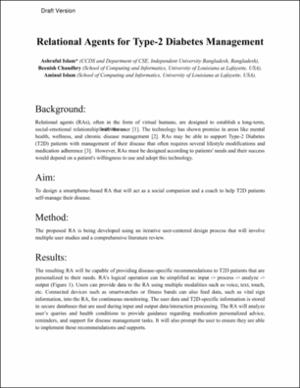Relational Agents for Type-2 Diabetes Management

View/
Date
2023-10Author
Islam, Ashraful
Chaudhry, Beenish
Islam, Aminul
Metadata
Show full item recordAbstract
Relational agents (RAs), often in the form of virtual humans, are designed to establish a long-term, social-emotional relationship with the user [1]. The technology has shown promise in areas like mental health, wellness, and chronic disease management [2]. RAs may be able to support Type-2 Diabetes (T2D) patients with management of their disease that often requires several lifestyle modifications and medication adherence [3]. However, RAs must be designed according to patients' needs and their success would depend on a patient's willingness to use and adopt this technology. To design a smartphone-based RA that will act as a social companion and a coach to help T2D patients self-manage their disease. The proposed RA is being developed using an iterative user-centered design process that will involve multiple user studies and a comprehensive literature review. The resulting RA will be capable of providing disease-specific recommendations to T2D patients that are personalized to their needs. RA’s logical operation can be simplified as: input -> process -> analyze -> output (Figure 1). Users can provide data to the RA using multiple modalities such as voice, text, touch, etc. Connected devices such as smartwatches or fitness bands can also feed data, such as vital sign information, into the RA, for continuous monitoring. The user data and T2D-specific information is stored in secure databases that are used during input and output data/interaction processing. The RA will analyze user’s queries and health conditions to provide guidance regarding medication personalized advice, reminders, and support for disease management tasks. It will also prompt the user to ensure they are able to implement these recommendations and supports. Integrating RAs into T2D management holds immense promise for revolutionizing the way individuals interact with their conditions and healthcare. In the future, further refinements of this RA will be crucial in evaluating its large-scale effectiveness and adoption.
Collections
- 2023 [67]